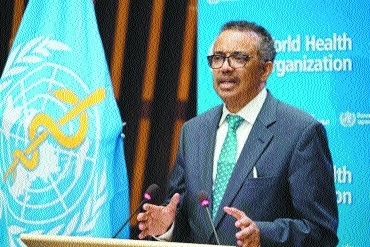Over 25 world leaders have called for pandemic treaty: WHO chief
| Date :03-Apr-2021 |

OVER 25 leaders from “the G20, G7 and from every region” have unanimously called for an international treaty for pandemic preparedness and response, the World Health Organisation (WHO) chief said.
“The pandemic treaty would be a generational commitment to keeping the world safe from new pathogens with pandemic potential in the future,” Xinhua news agency quoted WHO Director-General Tedros Adhanom Ghebreyesus while addressing a presser on Thursday.
Ghebreyesus said that there is “an acknowledgement and humility from those leaders that collectively the world was not prepared for the first coronavirus pandemic ever seen and that going forward we must collectively do better in future outbreaks.”
Globally, COVID-19 has infected nearly 129 million people and claimed 2.83 million lives so far. The world leaders, this week, joined the call for a pandemic treaty, which aims to prepare the world for new pathogens with pandemic potential in the future, which, according to Ghebreyesus, is “not a matter of if but when”, the report said.
Earlier on Wednesday, the WHO in a statement said that the COVID-19 pandemic is the biggest challenge to the global community since the 1940s, and that no single Government or multilateral agency can address other pandemics and major health emergencies in the future.
India ‘fully supports’ WHO’s call for China to share data on COVID-19 origins
INDIA on Thursday said that it fully supports the World Health Organisation Director-General Tedros Adhanom’s expectation that future collaborative studies will include more timely and comprehensive data sharing but raised concerns over China’s delaying tactics and lack of access to “complete, original data and samples”.
Tedros, who has been accused of complacency towards China, hardened his tone acknowledging the concerns about China’s refusal to share raw data about early COVID-19 cases.
He conceded the international experts faced problems with data access in Wuhan. “In my discussions with the team, they expressed the difficulties they encountered in accessing raw data. I expect future collaborative studies to include more timely and comprehensive data sharing,” he said.